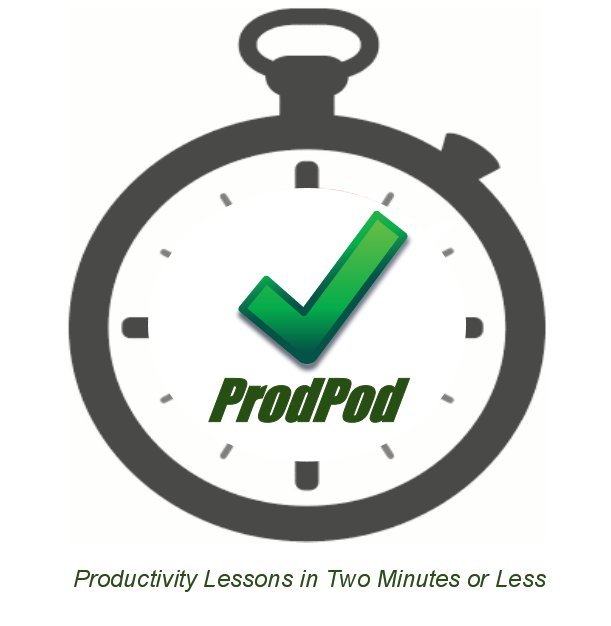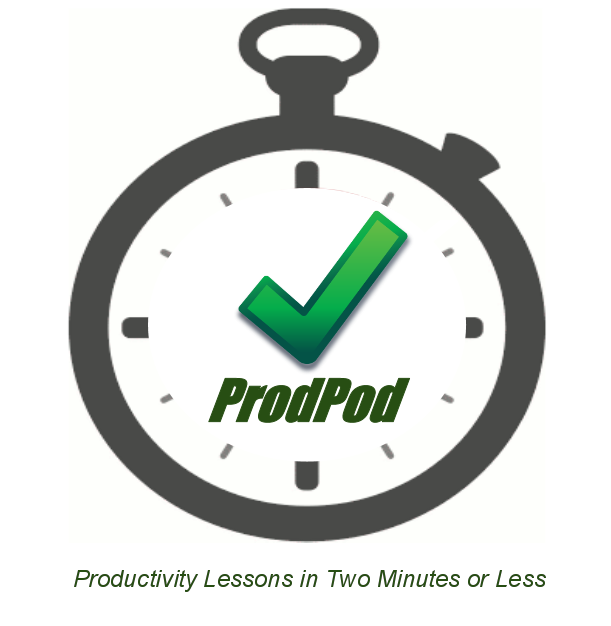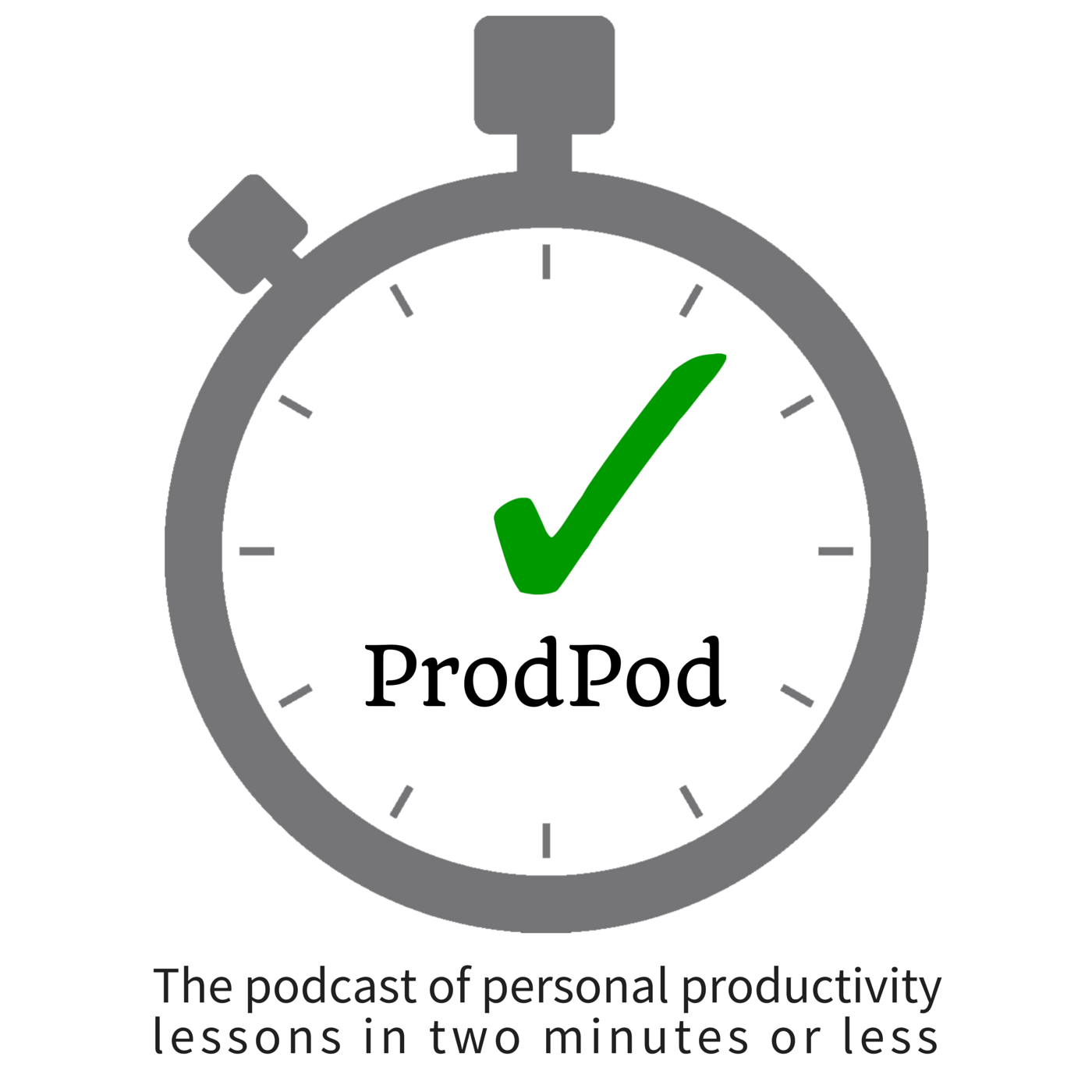Episodes

Tuesday Jun 26, 2012
ProdPod: Episode 38 -- Outsource Your Personal Tasks, Part I
Tuesday Jun 26, 2012
Tuesday Jun 26, 2012
Welcome to Episode 38 of ProdPod, the podcast of productivity lessons in two minutes or less. This is the first episode in a four-part ProdPod series on outsourcing your personal tasks in life. Enjoy!
For many of us, we feel overwhelmed not by the many things we are doing on a daily basis but by the many things we want to be doing additionally or instead of what we're already doing everyday. Furthermore, we find ourselves responding more often to communication than actively doing what we've planned. Think of Dr. Stephen Covey's thoughts on doing more "important, not urgent" activities than the other three quadrants of "not important, not urgent," "not important, urgent," and "important, urgent" distractions. If you don't know what the Merill/Covey Matrix looks like, head over to Google Images or Wikipedia and search for it to see how this long-term goals planning tool works.
Well, if you are struggling with these distractions (which many times still need to be managed or handled in some way, shape or form) I think there's an answer for you. There's a burgeoning industry in the area of personal outsourcing; the IT sector has seen the greatest growth and media exposure in outsourcing generally but this is even more defined. Administrative, professional and executive secretaries, assistants and concierges (some with very specialized skills) are jumping on the entrepreneurial bandwagon and are helping everyday people at reasonable prices to get the laborious, time-consuming and mundane tasks of life done.
Now, while there's plenty of discussion about virtual assistants on the Web today, the fact is that you probably need a variety of people to do more specialized outsourcing in your personal life. That is, everyone who can afford it should hire at least a virtual assistant, then possibly a personal concierge and a daily money manager for more specialty tasks. In the next episode I'll explain what each of those roles are and how you can utilize them.

Tuesday Jun 12, 2012
Tuesday Jun 12, 2012
Email is one of the most powerful and pervasive communication tools in our day-to-day lives, especially at work. Email is also one of the most persistent and systemic interruptions when you get too many messages, or consistently receive messages that were unsolicited, ill-written and/ or misdirected. In this episode, I'd like to look at building a culture on solid email communication grounds, using the office as a typical example; although, this can be applied to any personal, professional, family or group dynamic.
At the office, you have a policy for just about everything. So, why not have a policy that actually helps your email and other communications to facilitate uninterrupted, productive time for you and your coworkers to get things done.
Find a way to escalate important-urgent messages. Talk with your coworkers about how to call attention to matters that need an immediate response. In other words, answer this question: "When someone needs something 'right away,' how do we ask for them to help us?"
For example, you might decide that if something can wait for hours or even a day or two, to send your message by email. If something needs a faster response, consider using the phone, text, instant message or a "tap on the shoulder." Then, of course, if you need a digital paper trail, send an email.
Try a five-day experiment with just one or two people on your team, people you work with well. You're likely to find that the more you practice these techniques, the more efficient and productive you'll become...and the rest of your organization.

Tuesday May 01, 2012
Tuesday May 01, 2012
I had the pleasure of interviewing Paula Whitacre, principal, Full Circle Communications, which provides writing and editing services to help organizations reach wider audiences. She provided a great quick tip on writing productivity. Enjoy! Oh, and if you get a chance, please subscribe to Paula's e-newsletter, Ease in Writing. (I think that link will work; if it doesn't, visit her website and subscribe from the email field on the main page of the site.) Ease in Writing is clear, succinct and always helpful.

Tuesday Apr 24, 2012
ProdPod: Episode 35 -- Emotional Intelligence and a Productive Life
Tuesday Apr 24, 2012
Tuesday Apr 24, 2012
In 1996, Daniel Goleman wrote his hit book, Emotional Intelligence: Why It Can Matter More Than IQ. Mr. Goleman is a journalist, and not a scientist, but nevertheless he made a break-through in the way in which humans understand ourselves by giving context to the new ways scientists were learning about our psychology. Here's the book in a nutshell and how it relates to productivity. The premise of the book is quite simple: raw intelligence (IQ) tests score a human metric that doesn't correspond directly with success in life, and that emotional intelligence (or, EQ) is a psychosocial skill that should be taught so that humans are more productive members of society. Goleman heavily relies on studies to support his theory, and I think he does so quite successfully. The study that stood out for me the most when I read it fifteen years ago now, was a study that appears deep in the book in Part III, Chapter 10, "Managing with Heart." In this chapter, the author describes how researchers basically test high IQ people using emotional intelligence tests. They found that the high IQ individuals that were mostly average and below average on the EQ tests were also those that started many projects or tasks at a time and didn't complete them. Those that shined on the EQ tests were the ones that took pride in completing their projects or tasks. We know anecdotally that successful people in life are usually those that get things done not just get things going. I think this makes a real statement for all of us living in the Digital Age. Focus on finishing what you set out to accomplish and don't get distracted and fragmented in your goals. You'll not only have greater emotional intelligence but you'll also see more success in your productive life.

Tuesday Apr 17, 2012
Tuesday Apr 17, 2012
Partly because I'm a tech geek and partly because of my professional responsibilities, I get to see a dizzying array of new technologies every day. And, I try to keep most of them swimming around in my head to differentiate the potential winners and likely losers in the market. FastCustomer is a productivity tool that I believe is one of those potential winners. According to its website, it is trying to "make customer service better for both companies and consumers." I think the concept (as I'll explain momentarily) is amazing and I hope it continues to be adopted by the broader consumer market and corporate customer service departments. Here's the problem it solves, how it works and what it means for your personal productivity. As you know, trying to get customer service on the line can sometimes be a major headache. FastCustomer steps in as a free Web, mobile SMS and smartphone app technology that waits for you, then connects you to customer service so you don't have any wait time. You can access the service via FastCustomer.com, install their Firefox or Chrome Web browser extensions, text 936-CALL-PLS, or use their Apple iOS or Android-based smartphone applications. You let them know what company you need a customer service call from and they do the rest for you. Once a representative is brought on the line, FastCustomer calls you and puts the representative on the phone. Poof! Think of the hours you'll save waiting from on hold! A few important details:
- the service is available in the United States and Canada presently and not all businesses' phone systems support FastCustomer;
- there's a human element to FastCustomer, meaning that the customer service rep needs to listen to FastCustomer's directions when they get on the line so that they don't disconnect your call before you pick up the line; and,
- if a company is not listed, you can request them to get listed but that doesn't mean they have to listen.

